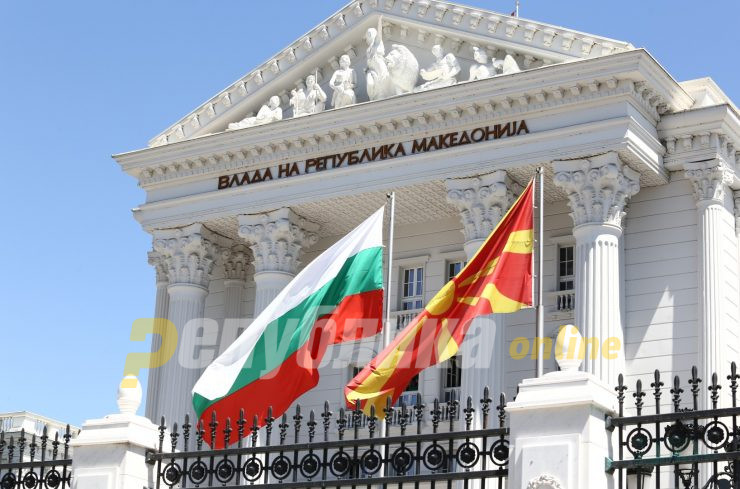Bulgaria should stop attaching undue weight to history, immediately unblock the start of EU negotiations with Macedonia, and implement the Friendship Treaty by working toward a warmer climate of cooperation, Bulgarian intellectuals write in an open letter to Bulgarian Prime Minister Boyko Borissov.
Also addressed to Bulgaria’s Foreign Minister Ekaterina Zakharieva, Ambassadors of EU Members State to Bulgaria, and the EU Delegation in Bulgaria, the letter expresses concern that political elites have unraveled the bilateral progress made after the countries signed the Friendship Treaty in 2017.
“There is an alarming increase, including at a high political level, of insulting behavior, arrogance and short-sighted historical interpretations with a clearly nationalistic and chauvinistic flavor,” signatories note.
“We are particularly concerned that Bulgaria has blocked the start of accession negotiations between the RNM and the European Union without providing a clear justification in the framework of international relations.”
According to the letter, this may damage Bulgaria’s international reputation as a responsible member state of the European Union and NATO. It has also jeopardized the friendship, good neighborliness and cooperation that are the main pillars of the landmark treaty.
“The Republic of Albania’s schedule of EU membership negotiation which is tied with that of the Republic of Macedonia in also at risk,” signatories say. “Moreover, the geopolitical dimensions of this crisis should not be underestimated: our disunity is increasing our vulnerability to threats from outside the region.”
Although the treaty is based on good intentions, the letter continues, its implementation has failed so far because “an excessive emphasis [was placed] on historical issues” whereas socio-political, economic and other kinds of cooperation covered by the treaty have been disregarded.
Insisting that EU negotiations hinge on historical issues has imposed “undue political responsibilities” on the Joint Multidisciplinary Expert Commission on Historical and Educational Issues. Its work, going against modern historiography approaches, has undermined its own effectiveness, the letter adds.
“Complex multifaceted policy decisions with huge national, bilateral and geopolitical implications have become dependent on the Commission’s narrow expert opinions,” signatories write.
Drawing attention to both sides’ failings in the treaty’s implementation, the signatories nonetheless emphasize that “thousands of citizens in both countries continue to feel a natural connection at the level of everyday life.”
“Rather than participating through a series of attractive and innovative civic, academic, cultural, educational and other initiatives, citizens ended up as witnesses of fierce rhetorical fights between the heavyweights of historical scholarship on both sides of the border, replaying conflicting views from the 20th century. Instead of fostering creativity for the sake of a better future, this development mobilized historical sensitivities and stereotypes among the general public.”
The actions of politicians and diplomats have been inconsistent with the spirit, objectives and texts of the treaty, “including Bulgaria’s refusal to recognize the name of the official language of the RNM (a name recognized by the UN), its non-acceptance of the existence of a separate Macedonian nation and of the right of Macedonian citizens to self-determination,” signatories say.
“These approaches are unacceptable in the European political space,” they add, calling on Borissov, Zakharieva, and the EU diplomats to take urgent steps toward resolving the crisis.
“Bulgaria should immediately, in accordance with the established procedure, unblock the start of negotiations for membership of the RNM in the European Union. We call on you to do this before the end of 2020, within the framework of the German presidency of the Council,” the signatories say.
In bilateral relations, there should be “no place for conditions coercing one party to adopt the other party’s unrealistic demands, such as a full or partial renouncing of its people’s self-determination or its citizens’ right to self-identification,” they add.
“It is inappropriate to expect that, under whatever kind of negotiation process, any governing team would burden itself with the suicidal action of making a political decision regarding the self-identification of its citizens and ruling that, from a certain point, the entire population has changed its belonging to a certain ethnic group.
“We recall the traumatic experience of Bulgaria during the time of the communist regime when she tried to impose “the historical truth”, by repeatedly resorting, through political decisions, to assimilation of ethnic Turks, Pomaks and Roma, aiming to “revise” their ethnic and religious identity and impose a Bulgarian Christian “self-identification” – of the living and the dead alike. We further recall the fact that the “historical truth” in question was decided by “authoritative history commissions”.”
In conclusion, signatories call for a serious change in the philosophy, approaches, means and actions in implementing the Friendship Treaty.
They say the countries’ leaders should show strong leadership and political will by adopting a roadmap of specific time-bound activities toward a warmer climate of cooperation.
They support promoting political, diplomatic and civil exchanges; military cooperation; working together toward improvements in the economy, the environment, education, culture, science, the media and human rights protection.
They also support the proposal to name a part of the planned transport infrastructure between the two countries (in Corridor No 8) after Goce Delcev, to symbolize both the historic and present-day interconnectedness of people on both sides of the border.





Comments are closed for this post.